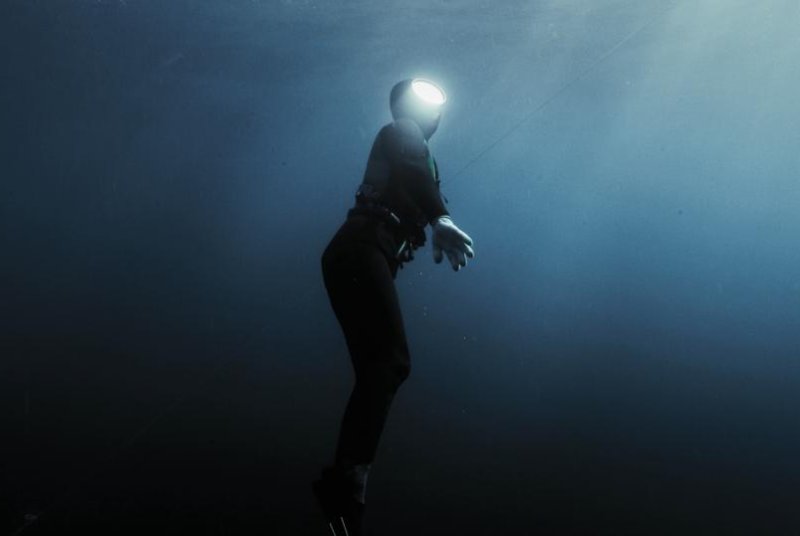1 of 3 | South Korea's Jeju Island women divers, the subject of films and books published in the United States, have been declining in number since UNESCO inscribed the divers as an intangible cultural heritage of humanity in 2016. Photo courtesy of Nicole Gormley
NEW YORK, June 25 (UPI) -- The female divers of a small South Korean island are winning the hearts and minds of American writers and filmmakers, even as their way of life slowly disappears amid modernity's push into remote parts of the country.
Lisa See, author of the bestselling 2019 novel The Island of Sea Women, told UPI she was motivated to write her first book of historical fiction set in 20th century Korea because of the haenyeo -- brave Korean diving women of Jeju Island, who can plunge up to 65 feet into the ocean while holding their breath for more than 3 minutes under water.
"What really inspired me from the very beginning was their physical courage," See said. "To go down that deep, in an environment that's unforgiving, and not allowing for any mistakes -- I felt that was really powerful."
The siren song of a vanishing culture at the far southern end of the peninsula was also difficult to resist for Nicole Gormley, a documentary director and television producer who has worked on the Netflix series Ugly Delicious with David Chang, the influential chef and founder of the Momofuku restaurants in New York.
The haenyeo represent a sisterhood, said Gormley, who filmed her friend, U.S. National Spearfishing Champion Kimi Werner, on the island only a few months before the coronavirus pandemic. Her work, a short documentary featured at this year's virtual Brooklyn Film Festival, includes narration from a pregnant Werner, who frankly discusses her fears about motherhood and its impact on her diving career. Korean haenyeo are known to dive during pregnancy.
"If you look at the women, the haenyeo, there's no one all-star diver," Gormley told UPI. "There's a kind of collective sharing of the burden of the haenyeo sisterhood."
Gormley, who has felt the pressure of working in a male-dominated industry that sometimes seems to "pit women against other women," said she was able to reconnect and recharge with the help of strong women like Werner and the haenyeo.
"No strong woman is ever created individually, or in a vacuum," she said. "It comes from our strength or ability to collaborate with other women."
Escape from patriarchy
Jeju remains somewhat of an outlier in South Korea, which has often been described as a deeply male-dominated society.
See, whose great-grandfather was the patriarch of Los Angeles Chinatown, said she struggled with the Confucian culture that assigns women to an inferior position.
"On Jeju, I saw a real rejection of that," said See, referring to the island's partly matriarchal economy ruled by women.
The author also began working on her book after feeling dismayed by the Trump administration's "chest beating" over North Korea.
"Especially at the beginning of Trump's presidency," she said, referring to the president's threats of "fire and fury" against Kim Jong Un.
"If we are going to declare war [on the peninsula], I'd like to know the history behind it."
See, who conducted extensive research into modern Korean history, including the period of Japanese colonial rule and the Korean War that led to the peninsula's division, portrays two women divers on Jeju in her novel.
Young-sook, the protagonist, inherits her sea diving livelihood from her mother. Her closest friend, Mi-ja, is an orphan whose father once worked with the Japanese -- an enemy whose soldiers terrorize the villagers and pose a threat to young and vulnerable women.
"For Young-sook, there's this sort of expectation she is going to take her mother's place," See said. "But to be Mi-ja, the daughter of a Japanese collaborator, that's a very different stamp on your forehead."
In the course of her investigations into the haenyeo, See said her interviews with women on Jeju yielded surprises, including hidden stories.
One woman who may have been the inspiration for Mi-ja spoke to See for an entire day, as her daughter, who was hearing the stories for the first time, translated her phrases into English.
The woman's daughter, pale and shaky after eight hours, said she was hearing stories from her mother that she had never heard in her life, See said.
"That was such an incredible moment for me," she said. "In all families, there are certain stories we don't tell and standard stories we do tell.
"But there are these huge blocks of stories we don't tell, because they're too painful."
The author, who is socially distancing herself from family and friends amid COVID-19, said her virtual meetings with book clubs across the country indicate The Island of Sea Women may be giving her readers perspective in challenging times.
"We think we're really in such a hard time right now. And we are. People have died. They've lost their jobs. I haven't seen my kids, and I haven't seen my grandson, my friends. It's very isolating and difficult in many ways," she said.
"But it's not like having a war or Japanese soldiers, or a [historical massacre] happening literally right outside your door.
"What we're going through right now doesn't even begin to compare to what has happened on that island or on the Korean Peninsula in general."
South Korea observed the 70th anniversary of the start of the Korean War on Thursday.















